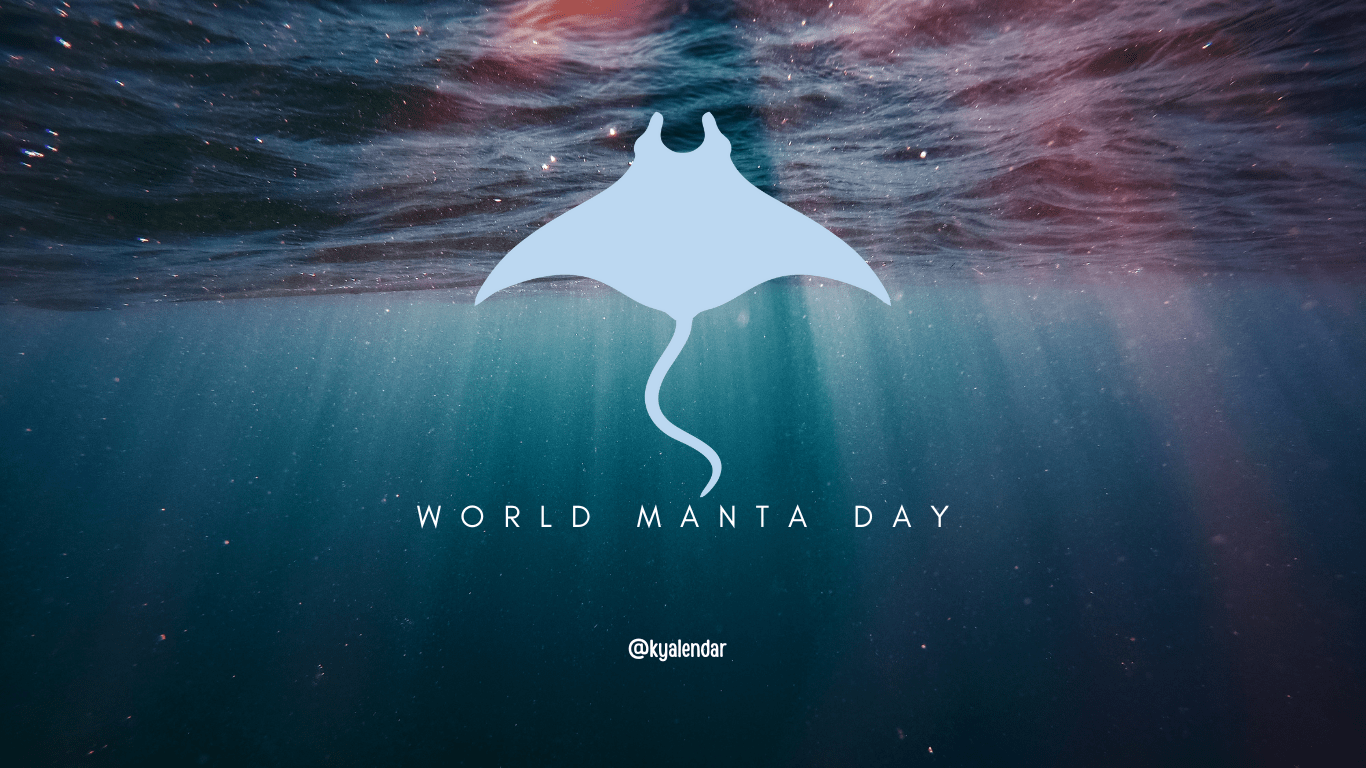
- This event has passed.
World Manta Day
September 17

World Manta Day, observed annually on 17th September, is a global event dedicated to raising awareness about the conservation of manta rays and their habitats. Manta rays are among the most fascinating and graceful creatures of the ocean, known for their impressive size, unique appearance, and gentle nature. This day highlights the importance of protecting these majestic animals and promoting efforts to ensure their survival.
Understanding Manta Rays
Manta rays are large, filter-feeding rays found in tropical and subtropical waters around the world. They belong to the genus Manta, which includes two recognised species: the reef manta ray (Manta alfredi) and the oceanic manta ray (Manta birostris). These rays are distinguished by their broad, triangular pectoral fins, which resemble wings and allow them to glide gracefully through the water.
Physical Characteristics
- Size and Shape: Manta rays can grow up to 7 metres across and weigh as much as 3,000 kilograms. They have a distinctive body shape, with a broad, flat disc and long, wing-like pectoral fins. Their large mouths are situated on the front of their heads, allowing them to filter feed on plankton and small fish.
- Appearance: Manta rays are typically black or dark grey on their dorsal side, with a lighter, white or pale underside. Their skin often features unique patterns and markings, which can help identify individual rays.
- Behaviour: Manta rays are known for their acrobatic displays and playful behaviour. They can often be seen performing barrel rolls and leaps out of the water. These behaviours may be related to feeding, communication, or simply play.
The Importance of World Manta Day
World Manta Day serves as a crucial platform for educating the public about manta rays and the challenges they face. The day aims to highlight the importance of conservation efforts and encourage actions that support the protection of these incredible creatures.
Key Issues Facing Manta Rays
- Habitat Destruction: Manta rays are vulnerable to habitat loss due to coastal development, pollution, and other human activities that impact their marine environments. Coral reef degradation, in particular, affects the ecosystems that manta rays rely on for feeding and breeding.
- Overfishing and Bycatch: While manta rays are not targeted by commercial fisheries, they are often caught accidentally as bycatch in fishing gear. This incidental capture can lead to injuries and deaths, further threatening their populations.
- Trade and Exploitation: Manta rays are sometimes targeted for their gill plates, which are used in traditional medicine and as a delicacy in some cultures. The demand for these products has led to illegal fishing and trade, putting additional pressure on manta ray populations.
- Climate Change: The impacts of climate change, including rising sea temperatures and ocean acidification, affect the health of marine ecosystems and can disrupt the migratory patterns and feeding behaviours of manta rays.
How to Celebrate World Manta Day
World Manta Day provides numerous opportunities for individuals and organisations to contribute to the conservation of manta rays. Here are some ways to get involved:
- Educate and Raise Awareness: Share information about manta rays and their conservation needs with friends, family, and your community. Use social media platforms to spread awareness and highlight the importance of protecting these animals.
- Support Conservation Efforts: Contribute to organisations and initiatives dedicated to the conservation of manta rays and their habitats. Many non-profits work on research, advocacy, and field projects to protect these creatures and their environments.
- Participate in Beach Clean-ups: Engage in local beach and ocean clean-up activities to reduce pollution and protect marine habitats. By keeping the ocean free from debris, you help create a safer environment for manta rays and other marine life.
- Adopt a Manta Ray: Some conservation organisations offer symbolic adoption programmes for manta rays. By adopting a manta ray, you support conservation projects and raise funds to protect these animals.
- Support Sustainable Practices: Make choices that reduce your environmental impact, such as supporting sustainable seafood options and reducing single-use plastics. These actions contribute to healthier marine ecosystems.
- Learn More About Manta Rays: Participate in educational events, workshops, and webinars focused on manta ray conservation. Understanding the biology and behaviour of manta rays can enhance your appreciation and commitment to their protection.
- Volunteer: Get involved with local or international organisations that work on marine conservation projects. Volunteering your time and skills can make a significant difference in conservation efforts.
The Global Impact of World Manta Day
World Manta Day is a significant event in the global effort to protect manta rays. By bringing attention to the challenges faced by these animals and promoting conservation actions, the day helps foster a greater understanding of their importance and the need for collective efforts to ensure their survival.
Collaborative Efforts
The success of World Manta Day relies on the collaboration of various stakeholders, including scientists, conservationists, policymakers, and the general public. Working together, these groups can implement effective conservation strategies, advocate for stronger protections, and support research to better understand and safeguard manta ray populations.
Future Prospects
Through continued awareness and action, there is hope for the future of manta rays. By celebrating World Manta Day and supporting conservation efforts, we can contribute to the preservation of these remarkable creatures and ensure that future generations can continue to marvel at their beauty and grace.
Conclusion
World Manta Day is an important occasion for celebrating and protecting manta rays, highlighting the need for continued conservation efforts and global awareness. By learning about these magnificent creatures, participating in conservation activities, and advocating for their protection, we can all play a role in ensuring the survival of manta rays and the health of our oceans.
4o mini
Details
- Date:
- September 17